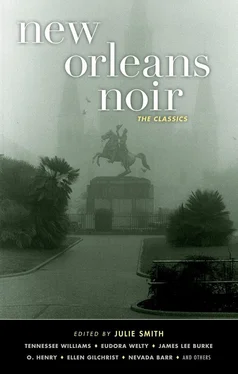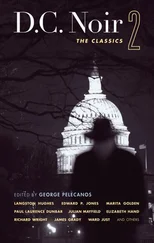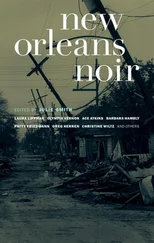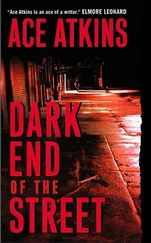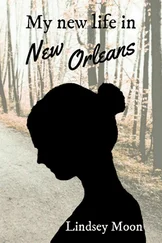Ace Atkins - New Orleans Noir - The Classics
Здесь есть возможность читать онлайн «Ace Atkins - New Orleans Noir - The Classics» весь текст электронной книги совершенно бесплатно (целиком полную версию без сокращений). В некоторых случаях можно слушать аудио, скачать через торрент в формате fb2 и присутствует краткое содержание. Город: New York, Год выпуска: 2016, ISBN: 2016, Издательство: Akashic Books, Жанр: Детектив, на английском языке. Описание произведения, (предисловие) а так же отзывы посетителей доступны на портале библиотеки ЛибКат.
- Название:New Orleans Noir: The Classics
- Автор:
- Издательство:Akashic Books
- Жанр:
- Год:2016
- Город:New York
- ISBN:978-1-61775-384-8
- Рейтинг книги:3 / 5. Голосов: 1
-
Избранное:Добавить в избранное
- Отзывы:
-
Ваша оценка:
- 60
- 1
- 2
- 3
- 4
- 5
New Orleans Noir: The Classics: краткое содержание, описание и аннотация
Предлагаем к чтению аннотацию, описание, краткое содержание или предисловие (зависит от того, что написал сам автор книги «New Orleans Noir: The Classics»). Если вы не нашли необходимую информацию о книге — напишите в комментариях, мы постараемся отыскать её.
takes a literary tour through some of the darkest writing in New Orleans history.
New Orleans Noir: The Classics — читать онлайн бесплатно полную книгу (весь текст) целиком
Ниже представлен текст книги, разбитый по страницам. Система сохранения места последней прочитанной страницы, позволяет с удобством читать онлайн бесплатно книгу «New Orleans Noir: The Classics», без необходимости каждый раз заново искать на чём Вы остановились. Поставьте закладку, и сможете в любой момент перейти на страницу, на которой закончили чтение.
Интервал:
Закладка:
“I never seen that picture before,” I said, loud as I could.
I’d never seen my daddy either. He was a steward on a United Fruit Lines ship, a real handsome man. He’d gone ashore at Antigua one day and forgot to come back.
“He looks mighty much like Chris,” Ma said as she cleared a space on the shelf over between the windows. She put the picture there. And I knew then that she’d got it out from the bottom of a drawer somewhere, because this was a special occasion for her too.
“Chris,” I said, remembering, “you never did tell us what you celebrating.”
He had twisted sideways in his chair and had his arms wrapped around the back. “I going in the army.”
Out of the corner of my eye I saw Pete staring at him, his mouth twisting and his face darkening.
Ma clucked her tongue against her teeth. “That a shame.”
Chris grinned, his head cocked aside a little. “I got to leave tomorrow.”
Pete swung back and forth on the two legs of his tilted chair. “Ain’t good enough for nothing around here, but we good enough to put in the army and send off.”
“Man” — Chris winked at him — “there ain’t nothing you can do. And I plain reckon you gonna go next.”
“No.” Pete spoke the word so that it was almost a whistle.
“I’m a man, me,” Chris said. “Can’t run out on what I got to do.” He tipped his head back and whistled a snatch of a little tune.
“I wouldn’t like to go in the army,” Lena said.
Chris went on whistling. Now we could recognize the song:
Yellow, yellow, yellow, yellow, yellow gal,
Yellow, yellow, yellow, yellow, yellow gal,
She’s pretty and fine
Is the yellow gal...
Lena tossed her head. “I wouldn’t like to none.”
Chris stopped whistling and laughed. “You plain sound like Pete here.”
Pete’s face all crinkled up with anger. I thought: He looks more like a Negro when he loses his temper; it makes his skin darker somehow.
“Nothing to laugh about,” he said. “Can’t do nothing around here without people yelling nigger at you.”
“Don’t stay around here, man. You plain crazy to stay around here.” Chris tilted back his chair and stared at the ceiling. “You plain crazy to stay a nigger. I done told you that.”
Pete scowled at him and didn’t answer.
Lena asked quickly: “Where you got to go?”
“Oregon.” Chris was still staring at the ceiling and still smiling. “That where you cross over.”
“You sure?”
Chris looked at her and smiled confidently. “Sure I’m sure.”
Pete mumbled something under his breath that we didn’t hear.
“I got a friend done it,” Chris said. “Two years ago. He working out of Portland there, for the railroad. And he turn white.”
Lena was resting her chin on her folded hands. “They don’t look at you so close or anything?”
“No,” Chris said. “I heard all about it. You can cross over if you want to.”
“You going?” I asked.
“When I get done with the stretch in the army.” He lowered his chair back to its four legs and stared out the little window, still smiling. “There’s lots of jobs there for a railroad man.”
Pete slammed the flat of his hand down against the table. Ma’s eyes flew open like a door that’s been kicked wide back. “I don’t want to pretend I’m white,” he said. “I ain’t and I don’t want to be. I reckon I want to be same as white and stay right here.”
Ma murmured something under her breath and we all turned to look at her. Her eyes had dropped half-closed again and she had her hands folded across her stomach. Her mouth opened very slowly and this time she spoke loud enough for us all to hear. “Talking like that — you gonna do nothing but break you neck that way.”
I got so sleepy then and so tired, all of a sudden, that I slipped sideways out of my chair. It was funny. I didn’t notice I was slipping or moving until I was on the floor. Ma got hold of my arm and took me off to bed with her. And I didn’t think to object. The last thing I saw was Lena staring at Chris with her long light-colored eyes. Chris with his handsome face and his reddish hair and his movements so quick they almost seemed jerky.
I thought it would be all right with them.
I was sick the whole next day from the beer; so sick I couldn’t go to school. Ma shook her head and Pete laughed and Lena just smiled a little.
And Chris went off to the army, all right. It wasn’t long before Lena had a picture from him. He’d written across the back: Here I am a soldier. She stuck the picture in the frame of the mirror over her dresser.
That was the week Lena quit school. She came looking for me during lunchtime. “I’m going home,” she said.
“You can’t do that.”
She shook her head. “I had enough.”
So she walked out of school and didn’t ever go back. (She was old enough to do that.) She bought a paper on her way home and sat down and went through the classified ads very carefully, looking for a job. It was three days before she found one she wanted: with some people who were going across the lake to Covington for the summer. Their regular city maid wouldn’t go.
They took her on right away because they wanted to leave. She came back with a ten-dollar bill in her purse. “We got to leave in the morning,” she said.
Ma didn’t like it, her quitting school and leaving home, but she couldn’t really stop her.
And Lena did want to go. She was practically jumping with excitement after she came back from the interview. “They got the most beautiful house,” she said to Ma. “A lot prettier than where you work.” And she told me: “They say the place over the lake is even prettier — even prettier.”
I knew what she meant. I sometimes went to meet Ma at the house where she worked. I liked to. It was nice to be in the middle of fine things, even if they weren’t yours.
“It’ll be real nice working there,” Lena said.
That next morning, when she had got her things together and closed the lid of the suitcase, she told me to go down to the grocery at the corner, where there was a phone, and call a taxi. They were going to pay for it, she said.
I reckon I was excited; so excited that I called the wrong cab. I just looked at the back cover of the phone book where there was a picture of a long orange-color cab and a number in big orange letters. I gave them the address, then went back to the house and sat down on the porch with Lena.
The orange cab turned at the corner and came down our street. The driver was hanging out the window looking for house numbers; there weren’t any except for the Stevenses’ across the way. Bill Stevens had painted his number with big whitewash letters on his front door. The cab hit a rut in the street and the driver’s head smacked the window edge. He jerked his head back inside and jammed the gears into second. Then he saw us: Lena and me and the suitcase on the edge of the porch.
He let the car move along slow in second with that heavy pulling sound and he watched us. As he got closer you could see that he was chewing on the corner of his lip. Still watching us, he went on slowly — right past the house. He said something once, but we were too far away to hear. Then he was down at the other corner, turning, and gone.
Lena stood and looked at me. She had on her best dress: a light blue one with round pockets in front. Both her hands were stuffed into the pockets. There was a handkerchief in the left one; you could see her fingers twisting it.
White cabs didn’t pick up colored people: I knew that. But I’d forgot and called the first number, a white number, a wrong number. Lena didn’t say anything, just kept looking at me, with her hand holding the handkerchief inside her pocket. I turned and ran all the way down to the corner and called the right number, and a colored cab that was painted black with gold stripes across the hood came and Lena was gone for the next four months, the four months of the summer.
Читать дальшеИнтервал:
Закладка:
Похожие книги на «New Orleans Noir: The Classics»
Представляем Вашему вниманию похожие книги на «New Orleans Noir: The Classics» списком для выбора. Мы отобрали схожую по названию и смыслу литературу в надежде предоставить читателям больше вариантов отыскать новые, интересные, ещё непрочитанные произведения.
Обсуждение, отзывы о книге «New Orleans Noir: The Classics» и просто собственные мнения читателей. Оставьте ваши комментарии, напишите, что Вы думаете о произведении, его смысле или главных героях. Укажите что конкретно понравилось, а что нет, и почему Вы так считаете.
